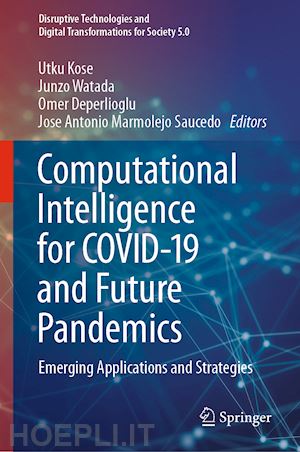
Questo prodotto usufruisce delle SPEDIZIONI GRATIS
selezionando l'opzione Corriere Veloce in fase di ordine.
Pagabile anche con Carta della cultura giovani e del merito, 18App Bonus Cultura e Carta del Docente
The book covers a wide topic collection starting from essentials of Computational Intelligence to advance, and possible application types against COVID-19 as well as its effects on the field of medical, social, and different data-oriented research scopes. Among these topics, the book also covers very recently, vital topics in terms of fighting against COVID-19 and solutions for future pandemics. The book includes the use of computational intelligence for especially medical diagnosis and treatment, and also data-oriented tracking-predictive solutions, which are key components currently for fighting against COVID-19. In this way, the book will be a key reference work for understanding how computational intelligence and the most recent technologies (i.e. Internet of Healthcare Thing, big data, and data science techniques) can be employed in solution phases and how they change the way of future solutions.
The book also covers research works with negative results so that possibledisadvantages of using computational intelligence solutions and/or experienced side-effects can be known widely for better future of medical solutions and use of intelligent systems against COVID-19 and pandemics. The book is considering both theoretical and applied views to enable readers to be informed about not only research works but also theoretical views about essentials/components of intelligent systems against COVID-19/pandemics, possible modeling scenarios with current and future perspective as well as solution strategies thought by researchers all over the world.
Utku Kose is an Associate Professor at Suleyman Demirel University, Turkey. He received a B.S. degree in 2008 from the computer education of Gazi University, Turkey. He received an M.S. degree in 2010 from Afyon Kocatepe University, Turkey, and D.S./Ph. D. degree in 2017 from Selcuk University, Turkey. He has over 100 publications including journal articles, authored and edited books, proceedings, and reports. He is also one of the series editors of the Biomedical and Robotics Healthcare Series, CRC Press. His research interest areas are artificial intelligence, machine ethics, artificial intelligence safety, optimization, chaos theory, distance education, e-learning, computer education, and computer science.
Junzo Watada received his B.Sc. and M.Sc. degrees in electrical engineering from Osaka City University, Japan, and his Ph.D. degree from Osaka Prefecture University, Japan. He is currently a Professor at the Department of Computer and Information Sciences, UniversitiTeknologi PETRONAS, and Professor Emeritus at Waseda University. He received the Henri Coanda Medal Award from Inventico in Romania in 2002. He is a Life Fellow of the Japan Society for Fuzzy Theory and intelligent informatics (SOFT). Prof. Watada is an IEEE senior member, Executive Chair of ISME, WCICME, a vice-president and life member, Forum of Interdisciplinary Mathematics. He contributes to editing various international journals as an editorial board member of more than 30 journals. His professional interests include artificial neural networks, human-centric data mining, soft computing, tracking systems, knowledge engineering, financial engineering, and management engineering.Omer Deperlioglu received his B.Sc. in Electric and Electronic (1988) from Gazi University, M.Sc. in Computer Science (1996) from Afyon Kocatepe University, Ph.D. in Computer Science (2001) from Gazi University. He is an Associate Professor of Computer Programming in the Department of Science, Vocational School of Afyon, Afyon Kocatepe University of Afyon, Turkey. His current research interests include different aspects of Artificial Intelligence applied in Power Electronics, Biomedical, and Signal Processing. He has edited a book and (co-) authored three books and over 50 papers.
Jose Antonio Marmolejo is a Professor at Panamerican University, Mexico. He received his Doctorate in Operations Research (Hons) from the National Autonomous University of Mexico. At present, Prof. Marmolejo has the second-highest country-wide distinction granted by the Mexican National System of Research Scientists for scientific merit (SNI Fellow, Level 2). He is a member of the Network for Decision Support and Intelligent Optimization of Complex and Large Scale Systems, Mexican Society for Operations Research, and System Dynamics Society. He has authored over thirty research articles in journals, books, and conference proceedings. His research areas are operations research, largescale optimization techniques, computational techniques, analytical methods for planning, operations, and control of electric energy and logistic systems, sustainable supply chain design, and digital twins in supply chains.











Il sito utilizza cookie ed altri strumenti di tracciamento che raccolgono informazioni dal dispositivo dell’utente. Oltre ai cookie tecnici ed analitici aggregati, strettamente necessari per il funzionamento di questo sito web, previo consenso dell’utente possono essere installati cookie di profilazione e marketing e cookie dei social media. Cliccando su “Accetto tutti i cookie” saranno attivate tutte le categorie di cookie. Per accettare solo deterninate categorie di cookie, cliccare invece su “Impostazioni cookie”. Chiudendo il banner o continuando a navigare saranno installati solo cookie tecnici. Per maggiori dettagli, consultare la Cookie Policy.